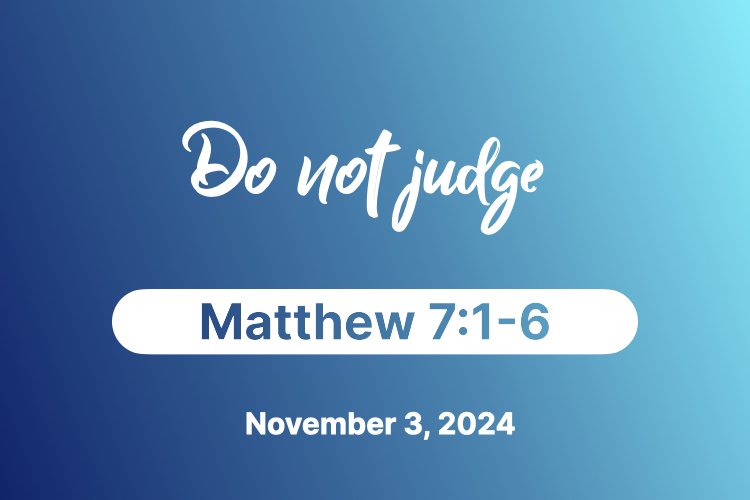Do not judge!
Passage: Matthew 7:1-6 Preacher: Mark Kingston
QUICK RECAP
Here are Jesus’ powerful words from Matthew 7: “Do not judge, or you too will be judged.” It’s a challenging teaching, isn’t it?
Jesus isn’t telling us to avoid making decisions or discerning right from wrong. Instead, He’s calling us to something deeper: to stop condemning others. When we judge, we’re stepping into a role that only God can fill. We don’t have the full picture, and we certainly don’t have God’s wisdom or love.
Jesus paints this vivid image of someone with a plank in their eye trying to help someone else with a speck in theirs. It’s absurd, but it’s true of us, isn’t it? We’re quick to point out others’ flaws while ignoring our own. But here’s the heart of the message: the way we measure others is the way we’ll be measured. If we offer grace, grace will return to us. If we condemn, condemnation circles back.
So, here’s my challenge for us this week: Let’s ask God to help us be people of radical generosity—generous with our grace, forgiveness, and love—just as He has been with us. Let’s leave judgment to God and focus on being a blessing to those around us.
5 QUESTIONS TO HELP YOU DIG DEEPER
These questions are designed to help you dive a little deeper into this topic. They're not just for your head, but for your heart too, so take your time with them. Maybe grab a coffee, find a quiet spot, and really let them sink in.
Have you ever felt condemned or unfairly judged by someone else? How did it make you feel?
Reflect on a time when you experienced judgment from others. How did it impact your sense of worth, and how did it shape your response to them?Have you ever found church to be a judgmental place? Why do you think that is?
Consider whether the church has sometimes been perceived as judgmental. What factors might contribute to this perception, and how can we change that narrative?How do we judge or condemn others in today’s world? How does society encourage judgment, and how do we participate in it?
Think about the ways judgment shows up in our everyday interactions—whether through social media, gossip, or quick assumptions. How does this align with or contradict Jesus’ teaching?How did Jesus approach judgment when He was on earth, especially with those who were marginalized or broken?
Explore examples from the Gospels where Jesus encountered people who “deserved” judgment by societal standards. What can we learn from His approach to grace and truth?What might it feel like to be freed from the need to judge others and instead focus on being a blessing? What challenges and opportunities does that present for you personally?
Imagine what your relationships and community could look like if you let go of 'condemning' kinds of judgment. What practical steps can you take this week to offer more grace and less condemnation?

